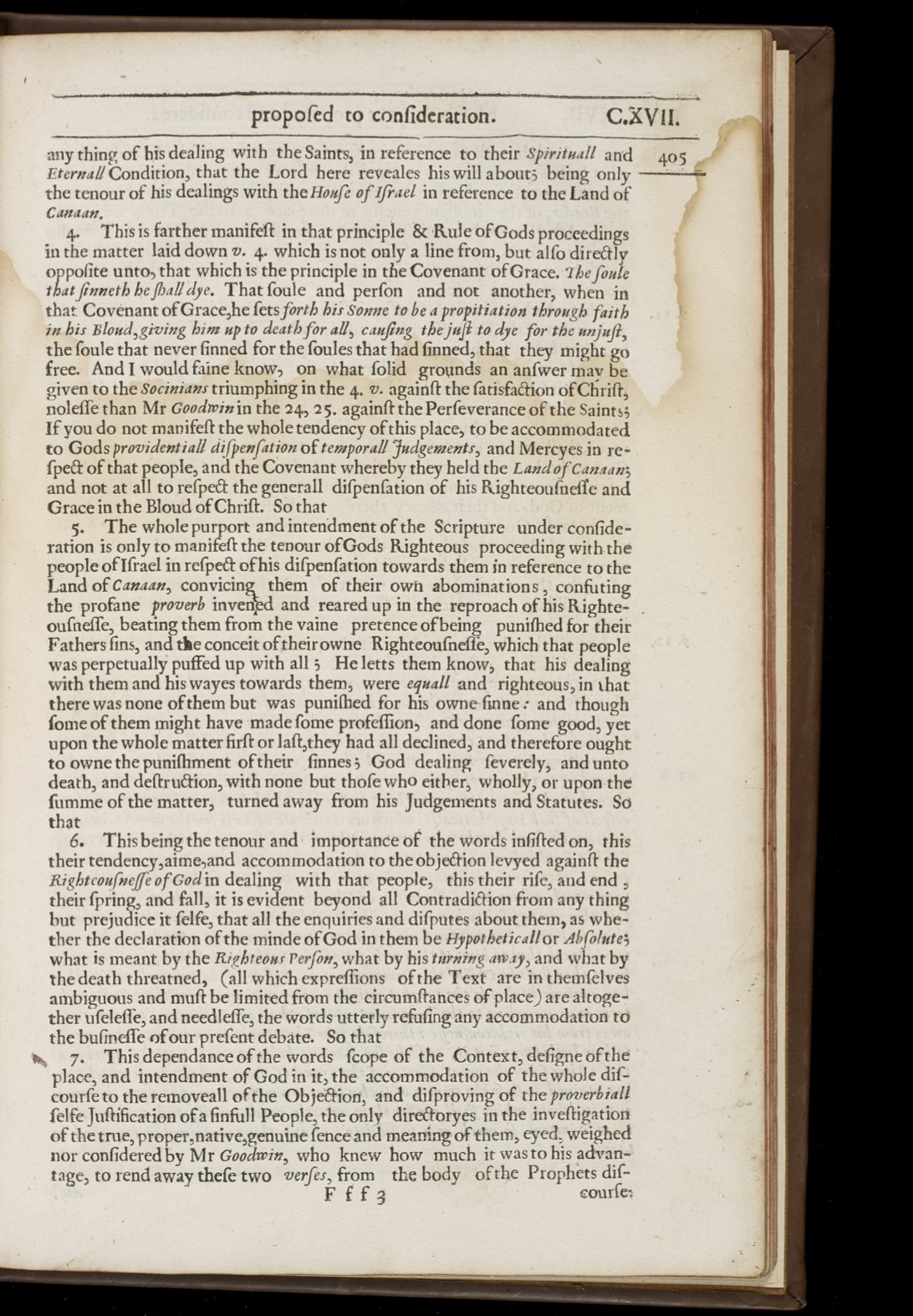

propoCed
to
confideration.
C.XVII.
any
thing
of
his
dealing with
the
Saints,
in
reference
to
their
Spiritual! and
Eternal/
Condition,
that the Lord
here
reveales
his will
about;
being only
the
tenour
of
his
dealings
with
the
Houfe
of
lfrael
in
reference
to
the Land
of
Canaan.
4.
This
is
farther
manifeft in
that
principle &
Rule
of
Gods proceedings
in the
matter
laid down v.
4.
which
is
not
only
a
line from,
but
allo
dire
&l
y
oppofite
unto, that
which
is
the
principle
in
the Covenant
of
Grace. ?hefoule
that
fnneth
he
fhall
dye.
That
foule
and perron and not another,
when in
that
Covenant ofGrace,he
fets
forth
his
Sonne to
be a
propitiation
through
faith
in
his Bloud,giving hint
up to
death
for
all,
caufing
the
jufl
to dye
for
the
unjufi,
the
foule
that
never
finned
for the
foules
that
had finned,
that
they might
go
free.
And
I
would faine know, on what
folid
grounds
an
anfwer may be
given to the
Socinians
triumphing
in
the
4.
v. againft
the
fatisfa&ion
òfChriíl,
noleffe than Mr
Goodwin
in
the
24, 25. againft
the Perfeverance
of
the
Saints;
If
you
do not
manifeft
the
whole tendency
of
this place,
to
be accommodated
to
Gods
providential) difpenfation
of
temporal)
judgements,
and
Mercyes in
re-
fpe&
of
that
people, and the Covenant whereby
they held
the
Land
o
f
Canaan;
and not
at
all
to
refpe&
the
generali difpenfation
of
his
Righteoulneffe and
Grace
in
the
Blond
of
Chrift.
So
that
5.
The
whole
purport and intendment
of
the
Scripture
under
confide-
ration
is
only
to
manifeft
the tenour ofGods Righteous proceeding
with
the
peopleofIfrael in
refpe&
of
his difpenfation towards
them
in
reference
to
the
Land
of
Canaan,
convicing
them
of
their own
abominations,
confuting
the profane
proverb
invenned
and reared up
in
the reproach
of
his
Righte-
oufneffe,
beating them from the
vaine
pretence
of
being punifhed for
their
Fathers
fins,
and
tie
conceit
of
their
Righteoufnefle,
which
that
people
was
perpetually
puffed
up with
all
;
He
Letts
them know,
that
his
dealing
with them and
his wayes
towards them,
were
equal)
and righteous,
in
that
there
was
none
ofthem but
was
punifhed for
his
owne
fume
t and though
force
of
them might have made
force profeffìon,
and done
force good,
yet
upon
the
whole
matter
firít or laft,they had
all
declined, and therefore
ought
to
owne
the
punifhment
oftheir
finnes;
God
dealing
feverely,
and
unto
death,
and deftru
&ion,
with none but thole who either, wholly, or upon
the
fumme
of
the matter, turned
away from
his
Judgements and Statutes.
So
that
6. This being
the
tenor
and importance
of
the
words
infifted
on, this
their
tendency,aime,and accommodation to the
obje&ion levyed againft
the
Righteoufneffe
of
God
in
dealing with
that
people,
this
their
rife,
and end
,
their
fpring, and fall,
it
is
evident beyond
all
ContradiCtion from any
thing
but
prejudice it
fell;
that
all
the
enquiries and difputes about
them,
as
whe-
ther
the declaration
of
the minde
of
God
in
them be
Hypothetical!or
Abfolsite;
what
is
meant by the
Righteous
Perfon,
what by
his
turning
away,
and what by
thedeath threatned,
(all which
expreffions
of
the
Text
are
in themfelves
ambiguous and
muff
be limited
from the circumftances
of
place) are altoge-
ther
ufeleffe,
and
needlefï'e,
the words utterly
refufing any
accommodation
to
the
bufinefí'e
of
our prefent debate.
So
that
1
7.
This dependance
of
the words
fcope
of the
Context,
defigne
of
the
place, and intendment
of
God
in
it, the accommodation
of
the
whole
dif-
conrleto
the
removeallofthe
Obje&ion, and difproving
of
the
proverbial'
felfeJuftification
of
a
finfull
People,
the
only dire&oryes in
the ínvefigation
of
the true, proper,native,genuine
fence
and
meaning
of
them,
eyed, weighed
nor confderedby Mr
Goodwin,
who knew how much it
was
to
his
advan-
tage, to rend
away thefe
two
verfes,
from the body
of
the Prophets dif-
Fff3
courfe;
405
e










